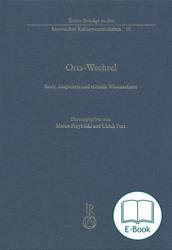Focusing on the concept of ’changing places’, the essays in this anthology discuss processes of constitution, stabilization, and transformation of ’worlds of knowledge‘, covering a wide range of thematic and historical perspectives from the European Middle Ages to the 21st century. Objects as eclectic as church buildings, panel paintings, etchings, pieces of narrative and dramatic literature, motion pictures and TV genres serve to illustrate how access to as well as the interpretation of ’stocks of knowledge‘ is determined by spatial orders and their oscillations.
The concept of ‘changing places‘ is an important aspect of constitution, stabilization but also transformation of ‘worlds of knowledge‘. The essays of this anthology covering a wide range of thematic and historical perspectives from the European Middle Ages to the 21st century and discuss their correlations (inter-)disciplinary from the science of history over the philology to art and film studies. These perspectives are described and analyzed within three operative guiding principles – ‘place‘, ‘order‘ and ‘oscillation‘. ‘Place‘ is understood to mean the spatial concretion as well as an imaginable dimension, ‘order‘ is comprehended as ideal systematization of spaces and stocks of knowledge and ‘oscillation‘ is defined as an dynamic aspect of transgeneral passing and obliteration of knowledge. Important questions focus on space-knowledge, the proportion of fragmentation and isolation, the relation between horror vacui and beguilement as well as the relationship between spaces of art and artificial spaces. The concrete offset of change of places and ‚worlds of knowledge‘, on which the essays of this anthology are focused, broach the issue of real places like the Roman Nuremberg, the cathedral of Trier, Greenland and the south pole. They also regard TV-(counter) worlds of the British Empire and sites of crime in political crime thrillers as well as fictional spaces and ordo-imagination in Arthurian romance and anachronistically Marian apparitions in the theater of the Weimar classicism. Likewise they focus on art which is inspired by Dante’s ‘inferno‘, the spaces for damned people. All these cases illustrate how access to as well as the interpretation of ‘stocks of knowledge‘ in their stabilization but also in their changes is determined by spatial orders and their oscillations.
Prof. Dr. Ulrich Port
Vita:
- Studium der Germanistik, Philosophie, Erziehungswissenschaft und Kunstgeschichte in Köln und Berlin
- erstes Staatsexamen 1992 in Köln
- Promotion 1995 in Köln mit dem Titel: „Die Schönheit der Natur erbeuten“. Problemgeschichtliche Untersuchungen zum ästhetischen Modell von Hölderlins „Hyperion“
- Habilitation 2003 in Köln mit dem Titel: Pathosformeln. Die Tragödie und die Geschichte exaltierter Affekte
- seit 2006 Professor für Neuere deutsche Literaturwissenschaft an der Universität Trier
Schwerpunkte Lehre und Forschung:
Systematisch: Ästhetik; Beziehungen zwischen Literatur, Philosophie und bildender Kunst; Literatur, Religion und Mythos; literarische Anthropologie; Tragödie und Tragödientheorie; Kulturgeschichte der Natur
Historisch: Literatur und Ästhetik von 1750-1830; Nietzsche; Literatur der Weimarer Republik; Barockrezeption; Kulturtheorie des Warburg-Kreises
Prof. Dr. Martin Przybilski
- seit 2006 Professor für Neuere deutsche Literaturwissenschaft an der Universität Trier
- Studium in Paderborn und Würzburg (M.A. 1996, Promotion 1999)
- Magister 1996
- Promotion 1999 mit dem Titel: sippe und geslehte. Verwandtschaft als Deutungsmuster im 'Willehalm' Wolframs von Eschenbach.
- Habilitation 2008 mit dem Titel: Kulturtransfer zwischen Juden und Christen in der deutschen Literatur des Mittelalters
- 2003-2009 Juniorprofessor für Ältere deutsche Philologie - Literatur des Mittelalters an der Universität Trier
- seit SS 2009 geschäftsführender Leiter des Historisch-Kulturwissenschaftlichen Forschungszentrums Trier
- seit WS 2009 Universitätsprofessor für Ältere deutsche Philologie - Literatur des Mittelalters an der Universität Trier
Schwerpunkte Lehre und Forschung:
Systematisch: Heldenepik; Wolfram von Eschenbach; 'Prosa-Lancelot'; jüdisch-christlicher Kulturtransfer im deutschen Mittelalter; Darstellung und Codierung von Affektivität in der Vormoderne; historische Repräsentationsformen von Luxus; Editionsphilologie; Fiktionalität des höfischen Romans; Wissensraum "Krieg"
Historisch: hochmittelalterliche Literatur; vorreformatorisches Nürnberger Fastnachtspiel; Kulturgeschichte der deutschen Literatur im Mittelalter; historische Geschlechterstudien
The new publication series entitled “Trierer Beiträge zu den historischen Kulturwissenschaften” (Trier Papers in Historical Cultural Studies) aims at being a forum for papers in the area of Cultural Studies, which focus on historical and interdisciplinary research. In addition to essay collections and conference proceedings, the series also covers monographic studies as well as exhibition catalogues.
The editor of the book series is the Executive Board of the “Historisch-Kulturwissenschaftliche Forschungszentrum” (HKFZ) Trier (Trier Historical Cultural Research Centre) at Trier University. The Research Centre is financed in line with the research initiative of Rhineland-Palatinate. The HKFZ’s current research topic is called “Räume des Wissens – Orte, Ordnungen, Oszillationen” (“Spaces of Knowledge – Places, Orders, Oscillations”). In collaboration with national and international partners, groups of linked projects work on this topic at Trier University.


 Table of Contents
Table of Contents